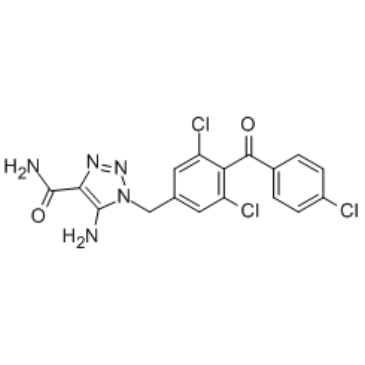Carboxyamido-triazole inhibits proliferation of human breast cancer cells via G(2)/M cell cycle arrest and apoptosis.
Lei Guo, Zhi-Song Li, Hong-Ling Wang, Cai-Ying Ye, De-Chang Zhang
Index: Eur. J. Pharmacol. 538(1-3) , 15-22, (2006)
Full Text: HTML
Abstract
Carboxyamido-triazole (CAI), a voltage-independent calcium channel inhibitor, has been shown to be able to induce growth inhibition and apoptosis in cancer cells. In the present study, we demonstrate that CAI significantly inhibits proliferation of cultured MCF-7 human breast cancer cells in a dose-dependent manner with an IC(50) of approximately 26 microM. Reduced proliferation of MCF-7 cells in the presence of CAI correlated with accumulation of cells in G(2)/M phase and induction of apoptosis. A treatment of MCF-7 cells with 30 microM CAI caused a time-dependent decrease in the levels of proteins that regulate G(2)/M progression, including Cdk1, Cyclin B1, and Cdc25C. A simultaneous increase in the expression of p21 protein was observed. We also demonstrated a concurrent decrease of the mitochondrial membrane potential (DeltaPsi(m)), and down-regulation of anti-apoptotic protein Bcl-2. In conclusion, it seems reasonable to hypothesize that the antitumor effect of CAI in MCF-7 cells is based on G(2)/M cell cycle arrest and inducing apoptosis.
Related Compounds
| Structure | Name/CAS No. | Molecular Formula | Articles |
|---|---|---|---|
 |
L-651,582
CAS:99519-84-3 |
C17H12Cl3N5O2 |
|
Comparison of the applicability of mass spectrometer ion sou...
[Eur. J. Mass Spectrom. (Chichester, Eng.) 21 , 91-6, (2015)] |
|
Differentially expressed and activated proteins associated w...
2015-01-01 [Respir. Res. 16 , 74, (2015)] |
|
Intergenerational cultural conflict, mental health, and educ...
2015-03-01 [Psychol. Bull. 141(2) , 404-46, (2015)] |
|
Increased B and T Cell Responses in M. bovis Bacille Calmett...
2015-01-01 [PLoS ONE 10 , e0132288, (2015)] |
|
Maintenance therapy in non-small cell lung cancer.
2015-01-01 [Expert Rev. Anticancer Ther. 15 , 839-46, (2015)] |